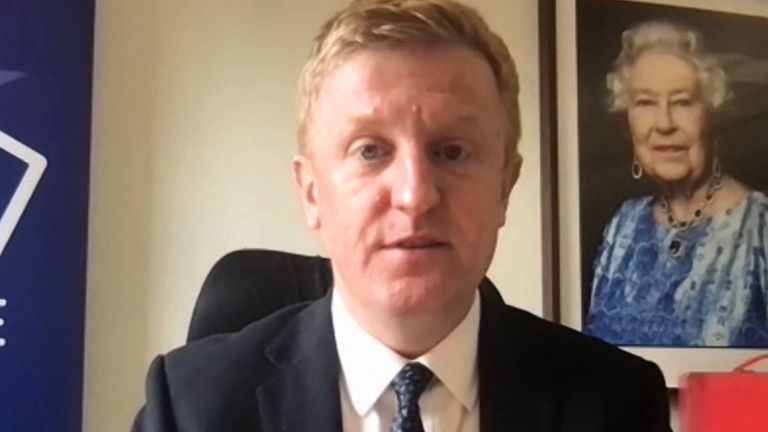European Super League: What it means for the clubs and the fans as nine teams withdraw
The European Super League (ESL) is in tatters with nine of the 12 founding clubs confirming they have withdrawn from the competition – so what happened and what does it mean for the clubs?
All six Premier League clubs – Liverpool, Manchester United, Manchester City, Arsenal, Chelsea and Tottenham – along with Spanish league leaders Atletico Madrid and Italy’s Inter Milan and AC Milan have said they are withdrawing from the hugely controversial league.
Chelsea’s decision came amid protests by hundreds of fans outside Stamford Bridge and followed similar events at Liverpool’s fixture with Leeds on Monday.
Following a meeting on Wednesday, La Liga’s Atletico Madrid confirmed they were pulling out and had “decided to formally communicate” its decision “not to finally formalise its adherence to the project”.
In Italy, Andrea Agnelli, chairman of Juventus, said that the league was no longer viable following the withdrawal of the six English clubs on Tuesday night.
Asked whether the project could still happen, Agnelli replied: “To be frank and honest no, evidently that is not the case.”
Juventus later released a statement in which they admit there are “limited possibilities” for the ESL to proceed in its original format, without explicitly confirming their intention to withdraw.
What do the latest developments mean for the Super League?
The withdrawal of the teams leaves behind just three of the founding members in a league which had earmarked £300m in “golden hello” payments for each club.
Italy’s Serie A side Juventus and Spain’s Real Madrid and Barcelona remain the only clubs still officially involved.
However, the ESL still vowed to “reshape the project” and insisted the withdrawal of the English sides was because of the “pressure” placed on them.
In a statement, the ESL said: “Given the current circumstances, we shall reconsider the most appropriate steps to reshape the project, always having in mind our goals of offering fans the best experience possible while enhancing solidarity payments for the entire football community.”
What could the future hold for the English clubs who signed up to the Super League and their owners?
The Premier League clubs’ bargaining position in European matters has been weakened following their resignation from the European Club Association (ECA), which lobbies UEFA on behalf of the clubs.
The ECA is yet to comment on whether they will be readmitted.
As the fallout continued, United’s executive vice-chairman Ed Woodward said he will be stepping down, an announcement which had reportedly been brought forward.
The ownership of the clubs is now set to come under increasing scrutiny from government and within the sport, with supporters at the six clubs and across the spectrum calling for changes.
The Chelsea Supporters’ Trust said the position of a number of the club’s board is now “untenable”.
Meanwhile, ex-Liverpool defender Jamie Carragher says club owners Fenway Sports Group should no longer continue at the helm at Anfield.
“I don’t know what they are hanging on for. I don’t see a future for the ownership on the back of this,” he told Sky Sports.
Former Liverpool winger John Barnes said football had been heading towards a “super league” ever since the inception of the Premier League in 1992.
He told BBC’s Breakfast programme: “If Liverpool fans are unhappy and they say they want to get rid of (owner) John Henry and want him to sell the club, who do they want him to sell the club to? Somebody with more money than him?
“If somebody comes in with the same amount of money, how do you think they got that money? By making decisions based on finance without regard (for the fans).”
The six English clubs could also still face Premier League sanctions despite backing out of the breakaway competition.
There have been calls for “appropriate action” to be taken against the clubs involved.
Section L9 of the Premier League’s handbook states that member clubs shall not enter or play in extra competitions without the prior written approval of the league’s board.
What does it mean for the current Champions League and European club competition?
Even though there are still three clubs from the original “dirty dozen” still to formally withdraw from the ESL, some reform to the current European competition structure is on its way.
UEFA, football’s European governing body, announced this week a new format for club competition starting in the 2024-25 season.
The changes will include the total number of teams competing in the Champions League increasing from 32 to 36 while the group stage will move to a single league format. Similar changes are also earmarked for the Europa League.
UEFA president Aleksander Ceferin had earlier welcomed the withdrawal of the English clubs, adding it was now important to “move forward together”.
But many see the Super League proposals as another example of “power-play” by some of the world’s richest clubs and a fresh attempt to control a bigger slice of the game’s wealth – and to put more pressure on UEFA and FIFA for the changes they want to see.
Will the government still carry out a review of the game?
A “fan-led review” under former sports minister Tracey Crouch will consider the issues surrounding the game – while Culture Secretary Oliver Dowden confirmed there could be the setting up of an Ofcom-style body to regulate the sport despite the withdrawal of the English sides from the ESL.
Mr Dowden told Sky News: “It’s very important that we don’t see this as the end of the process.
“What this has highlighted more than ever is the need to look at the wider governance of football.
“That’s why on Monday I announced a fan-led review…to look at how we address football governance, football finance and indeed the whole fan experience.”
Source: Read Full Article







